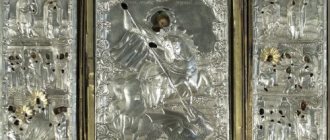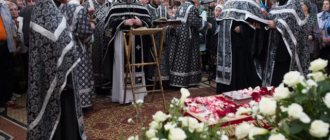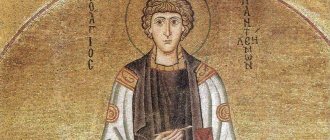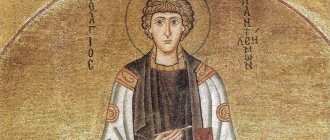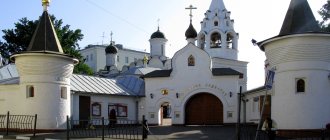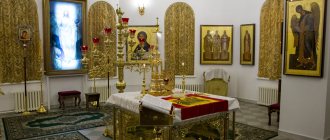This article is devoted to the analysis of the relationship between Abraham and Lot. The article was based on the works of Philaret Drozdov of Moscow on the interpretation of the book of Genesis (chapters 13–14).
Also on the site:
| Read the book of Genesis |
| Interpretations on the Book of Genesis |
| The story of Abraham. Abraham in the Bible |
| Lot in the Bible. Lot's wife and daughters. |
Lot: prophet, nephew of Abraham, saint
According to the Holy Scriptures, namely the Book of Genesis (chapters 11-14 and 19), Lot is the post-flood patriarch. He is the nephew of the prophet and patriarch Abraham, the son of his brother Haran. From Hebrew his name is translated as “cover”, “veil”. Canonized as a saint, his memory is celebrated in Orthodoxy on October 22 (9).
Righteous Lot, nephew of Abraham. Lot is the nephew of the prophet Abraham. He was the only one of his relatives, with the exception of Abraham's wife Sarah, who accompanied him during his migration to the land of Canaan. Photo: azbyka.ru
Lot is the only relative who accompanied the patriarch Araam, with the exception of his wife Sarah, during the resettlement to the land of Canaan. The Bible pays special attention to the flight of the prophet before the destruction of the wicked cities of Sodom and Gomorrah.
During this, his wife was turned into a stone pillar and seduced by his own daughters.
Lot was born and raised in Ur of the Chaldeans in Sumeria
The Old Testament Book of Genesis says that Lot is the son of Haran and the nephew of the ancestor of the Jews, Abraham. Lot was born and raised in Ur of the Chaldeans in Sumeria on the Euphrates River. It was located in lower Mesopotami.
This happened about 4,000 years ago. His father died early, and his grandfather took the whole family and went to the land of Canaan. Having reached Haran, Farah stopped and soon died.
Abraham's journey to the land of Canaan from Ur. The Abraham Road is shown with a red arrow. His nephew Lot, along with his servants, livestock and family, accompanied him. Photo: bibliya-online.ru
His uncle Abraham settled here after he left Egypt, where, thanks to the fact that he gave his wife to Pharaoh, he acquired many slaves and livestock. Lot, with the exception of Abraham's wife Sarah, was the only relative who accompanied Abraham during his migration to the land of Canaan.
Righteous Lot lived in Mesopotamia approximately 4,000 years ago.
The nephew and uncle walked together to Bethel. For some time Lott lived with his uncle, until various disagreements and disputes arose between Abraham's shepherds and his own regarding the pastures on which their flocks grazed.
Then Abraham suggested to him: “...separate yourself from me. If you go to the left, then I will go to the right, and if you go to the right, then I will go to the left” (Gen. 13:19). As a result, Lot began to live in the east, in the vicinity of Jordan. His possessions extended to the city of Sodom, which was located in the flowering Sidim Valley at the mouth of the Jordan River.
Lot's uncle Abraham saved him from enemy captivity
The Holy Scriptures say that Lot, Abraham's nephew, maintained close relations with the residents of the city of Sodom and often visited him. The Bible says that they: “...were evil and very sinful before the Lord” (Genesis 13:13).
Sodom itself was constantly involved in military conflicts between the cities located in the Sidim Valley. One day, five allied kings, including the kings of Sodom and Gomora, opposed the king of Elam, Chedorlaomer. As a result, they were defeated and their entire country was plundered.
Meeting of Abraham and Melchizedek. Peter Paul Rubens. When the king of Elam, Chedorlaomer, captured Melchizedek and Lot, Abraham and a detachment of slaves freed them. Photo: artchive.ru
Lot and his family were captured and lost all their property. Having learned about this, his uncle the prophet Abraham gathered a detachment of 318 slaves. At night, the detachment attacked the enemy and freed Lot along with all his property, as well as women and people. After this, Lot settled again in Sodom.
Among the sins of Sodom and Gomorrah, the Bible lists greed, inhospitality and homosexuality
Sodom and Gomorah were part of the union of the cities of Admah, Sheboim and Bela (Zoar). To date, the etymology of the names Sodom and Gomorrah is unclear. The name Sodom probably came from early Semitic languages, and is associated with the root sadama meaning “to speed up,” “strengthen,” “strengthen.” The name Gomorrah is possibly based on the root ghmr, which means "deep".
Video: Sodom and Gomorrah / Sodom & Gomorrah (WAR). at the 5th minute the author says that an archaeological expedition of scientists from the United Arab Emirates found the supposed location of the lost ancient cities of Sodom and Gomorrah.
In Abrahamic religions, the expression Sodom and Gomorrah is synonymous with unrepentant sins, the fall and divine retribution for sins. Scripture indicates that sins such as homosexuality, inhospitality, and greed were common to the spectators of these cities. Christian tradition considers them to be among the most serious sins.
"Abraham and the Three Angels" by Giorgio Vasari. After the angels brought the good news to Abraham that his elderly wife Sarah would give birth to a child, two of them went to Sodom to Lot. Here they were harassed by the Sodomites, who blinded them. Photo: ingailm.com
Lot did not attach moral significance to his captivity. He decided to return to Sodom and live there. At the same time, the Bible says that: “Living among (violently depraved) people,” the Apostle Peter notes about him, “this righteous man was tormented daily in his righteous soul, seeing and hearing lawless deeds” (2 Peter 2:8).
Thus, he remained submissive to the will of God, but did not understand His warning and did not leave the nest of sin.
After being released from captivity, righteous Lot began to live in Sodom.
The Holy Scripture says that when Lot was at the gates of Sodom, two angels came to him in the guise of two young men. After meeting with Abraham, they wanted to check whether its inhabitants were truly mired in sin.
Lot, knowing the inclinations of the Sodomites, invited the guests to his house, but they refused and decided to sleep on the street, but after much persuasion from Lot they agreed. The owner baked unleavened bread for them as a treat. Before the guests had time to go to bed, the inhabitants of the entire city came to his house and began to demand that the Sodomites “get to know” them.
Shelter a Stranger
Works of mercy are generally an important thing. In it we express our love for our neighbor. Therefore, it is worth visiting the sick, clothing the naked, supporting prisoners and welcoming strangers. We live in such a time that, of course, you won’t always let a stranger into your home (fearing for safety), but you shouldn’t refuse acts of mercy at all. What we do to our neighbor, we do to the Lord.
Abraham once sheltered three strangers, but it turned out that he received the Trinity Itself. A good lesson for us. Who knows, maybe one day the Lord will visit us like this, in the person of a sudden guest.
Vladimir Basenkov
Lot's wife turned around during her flight from Sodom, and the Lord turned her into a pillar of salt.
When Lot left Sodom, he told his daughters and wife to go and not look back. Thus, he carried out the instructions given to him by the Lord through his angels. Along the way, Lot’s wife could not stand it and violated God’s will. She looked back and turned into a pillar of salt. Lot himself and his daughters were saved (Gen. 19: 15-26).
The death of Sodom and the turning of Lot's wife into a pillar of salt. Lot's wife disobeyed the Lord's commandment and looked back while fleeing the city. For this she was petrified. Photo: school.orthpatr.ru
The interpretation of this is contained in the Bible. So the Lord, in one of his conversations about the destruction of Jerusalem and the end of the world, said: “Remember Lot’s wife” (Luke 17:32). Saint Philaret says that her turning into a pillar of salt is a special punishment from God for her crime.
Her sin against the Lord lies not in the fact that she turned around and looked at the burning city, but in the fact that she transgressed God’s commandments and had an addiction to the abode of depravity. Thus, she thought more about the material than the spiritual.
Josephus Flavius in “Jewish Antiquities” mentions the pillar into which Lot’s wife turned (Ant. I, II, 4).
Historians confirm the existence of a pillar of salt into which the wife of righteous Lot turned. It stood for a long time in the vicinity of Sodom as a monument to God’s wrath for man’s disobedience of God’s will.
The writer of the book of the Wisdom of Solomon (Wisdom 10, 7) mentions him, and among later writers - Josephus Flavius (Ant. I, II, 4) and even Bishop Clement of Rome (post. to Cor. ch. 1).
"Lot's Wife" on Mount Sodom. On the slopes of Mount Sodom there are several formations of rock salt, which legend attributes to their origin from Lot's wife turned to stone. Photo: upload.wikimedia.org
Nowadays in Israel, next to the Dead Sea in the industrial area “Dead Sea Factories” on Mount Sodom there is a pillar or column made of rock salt. She resembles in shape a woman dressed in a veil and is traditionally perceived as a petrified wife.
After fleeing Sodom, Lot lived with his daughters in the city of Zoar.
After Lot fled Sodom, he began to live with his daughters in the city of Zoar. The city where Lot lived was part of the union of five cities in the Valley of Sidim. Its name is translated as “small”, “insignificant”. Its name is also translated as Tsoar or Bella. There is still debate over whether the city of Zoar was located north or south of the Dead Sea.
Estimated location of the cities of Sodom, Gomorrah and Sior in the Kerek Valley based on archaeological excavations. Lot lived in the city of Zoar after the Lord destroyed Sodom and Gomorrah. Photo: cont.ws
The Crusaders called the city "villa palmarum". According to most interpreters, on the southeastern tip of the Dead Sea in the Kerek Valley on the border with the state of Moab. Here Lot did not live long because he did not feel safe. Soon he settled with his daughters in a cave on the nearest mountain.
Lot was guided by physical eyes
If someone or something has an attractive appearance, a beautiful shell, this does not mean that we should follow the advice of our eyes. If you're feeling anxious about buying a car or a home, or about getting a job or moving, it's best to stop and wait. Don't let anyone rush you. If you get an offer today, say no. Don't let anyone put pressure on you.
Wait and listen to what God has to say to you. Don't walk by sight, walk by inner evidence. Sometimes it is expressed in a feeling of anxiety. Wait a while and you will see what to do.
(Genesis 13:14)
And the Lord said to Abram, after Lot had separated from him: lift up your eyes, and from the place where you are now, look to the north and to the south, and to the east, and to the west; For all the land that you see will I give to you and to your descendants forever.
“Lift up your eyes”—God means spiritual eyes. Because for him to look around, spiritual vision was required. Lot was guided by carnal sight, and as a result he chose the wrong place. He was very limited and constrained. Lot did not know that these cities would soon be destroyed.
But Abraham trusted in God. This is the destiny he chose for himself. And everything that was located in the north, south, west and east went to him.
Which category do you want to belong to?
If you make decisions based on carnal vision, you will have limited blessings.
But if you trust in God, the blessing will be very great. Amen!
Lot's daughters gave him wine to drink and conceived sons from him.
When Lot lived as a hermit in a cave, his daughters lived with him and knew no men. In order to give birth to offspring, they gave the father wine and entered into a relationship with him. As a result, Lot's daughters gave birth to sons: the eldest was Moab, and the youngest was Ammon. The Bible talks about it this way: “And they made their father drink wine that night; and the eldest went in and slept with her father; but he did not know when she lay down and when she got up.
The next day the eldest said to the younger: behold, I slept with my father yesterday; Let's give him wine to drink that night too; and you go in and sleep with him, and we will raise up a tribe from our father. And they made their father drink wine that night; and the youngest came in and slept with him; and he did not know when she lay down and when she got up. And Lot's two daughters became pregnant by their father, and the eldest gave birth to a son, and called his name Moab. He is the father of the Moabites to this day. And the youngest also gave birth to a son, and called his name Ben-Ammi. He is the father of the Ammonites to this day.” (Genesis 19:33-38).
Lot and his daughters (Hendrik Goltzius, 1616). While the drunken Lot was sleeping, his daughters came to him and conceived his sons Moab and Amon. Photo: upload.wikimedia.org
Bible interpreters say that Lot’s daughters decided on such a base act because:
- They were afraid that men would neglect them because they came from cursed cities.
- The licentiousness of the Sodomites had already penetrated into them.
The Moabites and Ammonites are cursed in the Bible as a result of incest between Lot and his daughters.
The sin of incest is deeply condemned in the Holy Scriptures, which is why the Moabites and Ammonites are often cursed in the Bible. The Law of Moses provided for the death penalty for incest.
At the same time, the tribes of the Moabites and Ammonites became the basis of the ancient Arab people. After this plot, the name Lot is not found anywhere in the Holy Scriptures.
War of the Nine Kings
14:1 It happened in the days of Amraphel king of Shinar, Arioch king of Ellasar, Chedorlaomer king of Elan, and Tidal king of Goim,
14:2 That they went to war against Beri king of Sodom, against Birsha king of Gomorrah, against Shinab king of Admah, against Shemever king of Zeboim, and against the king Bela, which is Zoar.
14:3 All these gathered together in the valley of Siddim, where is now the Sea of Salt.
14:4 Twelve years they were enslaved by Chedorlaomer; and in the thirteenth year they were postponed.
14:5 So in the fourteenth year Chedorlaomer and the kings that were with him came and smote the Rephaim in Ashteroth-karnaim, the Emim in Ham, and the Emim in Shave-Kiriathaim.
14:6 And the Horites in their mountain Seir, as far as El Paran, which is by the desert.
14:7 Turning from there, they came to the spring of Mishpat, which is Kadet, and smote the whole field of the Amalekites, and also the Amorites who dwelt in Hatzzon-tamar.
14:8 Then came out the king of Sodom, the king of Gomorrah, the king of Admah, the king of Zeboim, and the king of Bela, which is Zoar; and prepared to fight with them in the valley of Siddim,
14:9 with Chedorlaomer king of Elam, Tidal king of Goim, Amraphel king of Shinar, Arioch king of Ellasar, four kings with five.
14:10 And in the valley of Siddim there were many wells of pitch. And so the kings of Sodom and Gomorrah, taking flight, fell into them; and the rest fled to the mountains.
14:11 The victors took all the wealth of Sodom and Gomorrah and all their grain and departed. In the days of Amraphel king of Shinar. It is strange that the time of war is signified by the reign of Amraphel, who is not the chief of the warring kings, but only an ally of Chedorlaomer, and whose reign, like the others, is unknown in Sacred History. Perhaps the reason for this is the primacy of the Babylonian kingdom in the time of its establishment and, perhaps, the order of its kings was still known according to legend in the time of Moses.
King of Ellasar. Instead of Ellasar in Jonathan's translation, Talassar is put, and in Syriac - Dalassar. Taking these names as one, some are looking for the kingdom of Talassar near the Euphrates, where the Edenites were conquered by the Assyrians ( Isa. XXXVII. 12 ).
King of Goim. They think that King Goim, which means king of the nations, or pagan, is the same as Joshua’s king Goim le-Gilgal ( Joshua XII. 23 ), and Gilgal is the same as Gelil, or pagan Galilee, in Isaiah ( IX. 1 ). The name of the kingdom of Goyim could have come from the mixing of different peoples in one area and under one rule. At least, this is known about Galilee of subsequent times, inhabited, according to the legend of Strabo ( L. XV. 4 ), by the Egyptians, Arabians, Phoenicians. Sodom, Gomorrah, Adma, Zeboim, Bela, which after Zoar, despite the division of the kingdoms, constituted one country, one union and, except for Bela, had one fate, which they deserved by their corruption ( Deut. XXIX.23 ).
But before He pours out all His wrath on them, God proclaims it to them and wants to turn them to repentance through the dangers and disasters of war.
Siddim. According to Aben-Ezra, this name should be derived from lime שיד, and by this name one can understand earthen resin, or bitumen, which was found in great abundance in the Siddim valley and served instead of lime.
The sea is salty. More common: the Dead Sea. For twelve years they were enslaved by Chedorlaomer. It should be noted here that Noah’s prediction about the slavery of Canaan is already beginning to be partially fulfilled.
Refaimov. The Rephaim were among the nations whose land God promised to the Israelites ( Gen. XV. 20 ). They lived in Bashan ( Josh. XII. 4. XIII. 12 ). In the translation of the seventy, the name of the Rephaim is sometimes replaced by the name of the giants: it actually sometimes has this sign in Holy Scripture ( Deut. II. 11 ). From this we can make a guess about the qualities of the people of Rephaim.Emimov. These lived in Moabite before the descendants of Lot ( Deut. II. 10 ).
Khorreyev. These are the inhabitants of the land of Idumea before the Edomites ( Gen. XXXVI. 20 ).
To El Faran. Or: to the Plain of Paran. The city of Paran existed even in the time of Jerome above Arabia, adjacent to Sracina (see Loc. Heb.).
To the source of Mishpat, which is Cadet. These names mean: Source of judgment and Sanctification. The reason for these names, according to some, is found in the History of Moses ( Num. XX. 10–13 ).
Field of Amalek. Since Amalek is a descendant of Esau ( Gen. XXXVI. 12 ), then here either through the field of the Amalekites should be understood the ancient inhabitants of the land of Amalek, or the Amalekites should be given another ancient origin. This last guess is in some way confirmed by the hatred of the Jews against the Amalekites, confirmed by God himself ( Ex. XVII. 14. 1 Sam. XV. 2 ), while He forbade fighting with the sons of Esau ( Deut. II. 5 ).
In Khatsatson-Tamara. This place was later called En Gedi ( 2 Chronicles XX. 2 ).
Lots of salt wells. It is not known whether this refers to oil springs or depressions made in the ground when bitumen was taken from it.
Righteous Lot is revered in Judaism, Christianity and Islam
In different religions, the attitude towards the figure of Lot is mostly positive. Moreover, in Judaism he is considered righteous, but his righteousness is disputed. The fact is that in his life Lot deviated from the truths of the Jewish path, and therefore his descendants did not become part of the Jewish people. He is mentioned in the Torah.
Lot's flight. Illustration from the book “Biblical Images” The Hague, 1728. The Christian tradition is sympathetic to the image of Lot. Photo: eleven.co.il
The Christian tradition is to be sympathetic to Lot. This can be seen in the New Testament. In the Second Epistle of Peter, Lot is called a righteous man, weary of life among violently depraved people. At the same time, it is separately indicated that the Lord saved him because he remained obedient to His will, and Lot’s wife turned to stone because she disobeyed Him.
Muslims know Lot under the Name Lut and consider him the messenger of God and His prophet. Islam retells the biblical story almost word for word. Moreover, unlike the Bible, the Koran says that Lut in Sodom and Gomorrah was supposed to preach monotheism and stop the lustful and cruel acts of the local residents.
Reasons for Lot's fall:
- Lot did not use his faith;
- The blessing was promised to Abraham, not Lot. The sacrament is not offered to everyone, but to those who have faith like Abraham (righteousness by faith).
Abraham gave a tenth of everything. Not everyone gives tithes, only those who have faith like Abraham.
(Genesis 14:21)
And the king of Sodom said to Abram: Give me the people, and take the property for yourself. (The king tempted Abram) But Abram said to the king of Sodom: I lift up my hand to the Lord God Most High, the Lord of heaven and earth (Abram exactly repeats everything that Melchizedek said), that I will not even take a thread and a shoe strap from all that is yours, so that you do not say : I made Abram rich.
Abraham knew that he would be very rich.
The Bible calls Lot righteous because he did not disobey the will of God
We learn that Abraham's nephew Lot is a righteous man from the second letter of the Apostle Paul. He says: “And he delivered the righteous Lot, who was weary of being treated among violently depraved men; for this righteous man, while he lived among them, was daily tormented in his righteous soul, seeing and hearing wicked deeds” (2 Peter 2:7). Few figures in the Bible have received such praise.
The Cave of Righteous Lot. Lot is called righteous because he did not disobey the will of the Lord. Photo: openarium.ru
However, Lot's righteousness cannot be considered obvious. The fact is that in the Holy Scriptures and theological texts his personality is mentioned in connection with a dispute between his shepherds and the shepherds of his uncle Abraham.
Here Lot chose the best pastures for himself, and Abraham agreed to any, just to maintain peace. In the end, Abraham is blessed and Lot has lost everything. This often happens to those who only in this way become like Lot and strive for earthly well-being.
Audio sermon Righteous Lot. Archpriest Andrey Tkachev. At 20 minutes the author begins the story about righteous Lot.
At the same time, the Bible calls Lot righteous for a reason. The fact is that he did not wallow in the sin of Sodom and remained faithful to the commandments of God. That is why the Lord spared him and gave him the opportunity to escape from Sodom before its incineration.
Moreover, he did not disobey His will as his wife did. He chose the fear of God and obedience, and saved his life. He loved God just as the law given through Moses said many centuries later.
By leaving a comment, you accept the user agreement
Captivity and conquest of Lot
Speaking about the separation of Abram and Lot, Moses noticed the mistake that the latter made by settling between evil and sinful people. Now he shows his misfortune, which was a consequence of this error, and continues to justify the behavior of Abram, who, by faith and hope in Providence, not only preserved his own safety, but was also able to return it to another.
In one narrative, the war of nine kings is combined, as an incident to the disaster of Lot (1–11), the disaster of Lot itself and the help of Abram (12–16) and the triumph of Abram, brilliant both in the honors bestowed upon him, and even more so in his piety and selflessness (17–16). 21).




